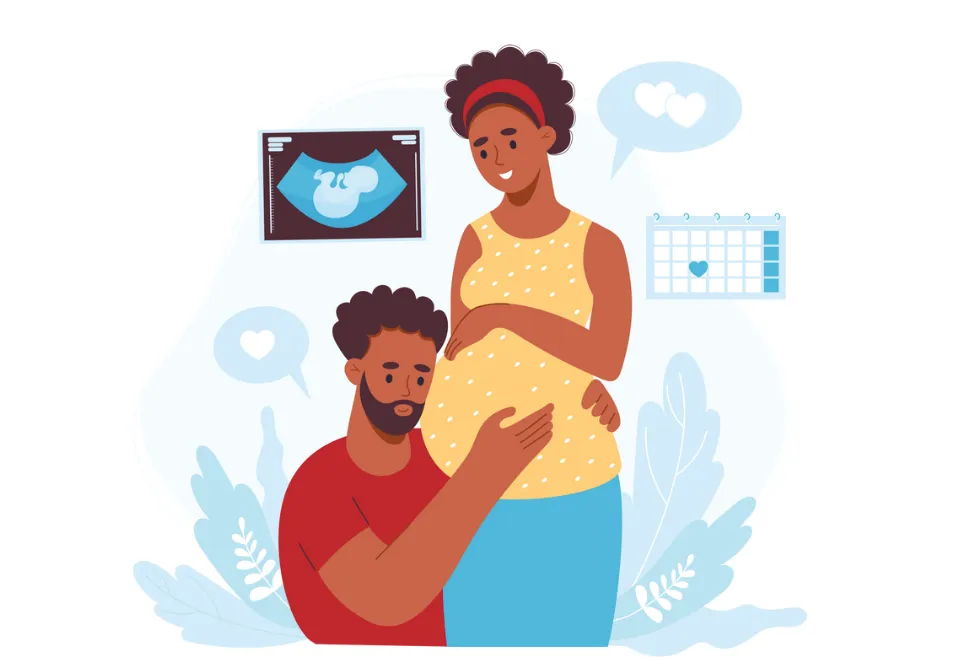Nýir og tilvonandi foreldrar

Bólusetningar geta veitt bæði foreldrum og börnum vörn áður en meðganga hefst, meðan á meðgöngu stendur og eftir meðgöngu.
Ónæmiskerfi viðkomandi er örlítið veiklað þegar viðkomandi er barnshafandi. Þetta getur þýtt að sýkingarvarnir þeirrar manneskju eru ekki eins sterkar. Þetta, ásamt öðrum breytingum sem eiga sér stað í líkamanum á meðgöngu, þýðir að barnshafandi konur geta verið í aukinni hættu vegna tiltekinna sýkinga og hugsanlegra fylgikvilla. Til dæmis getur COVID-19 og flensusmit verið alvarlegri á meðgöngu.
Barnshafandi einstaklingur deilir ónæmiskerfinu með ófæddu barni sínu og ákveðnar sýkingar sem viðkomandi fær geta einnig haft áhrif á barnið. Sjúkdómar eins og rauðir hundar og hlaupabóla (varicella) geta valdið fæðingargöllum. Þeir geta aukið hættuna á þungunarrofi — s.s. flensa. Gakktu úr skugga um að þú hafir fengið bólusetningu gegn rauðum hundum og hlaupabólu (ef þú hefur ekki áður fengið hlaupabólu) og ef þörf er á þá ætti fólk að fá bólusetningu fyrir meðgöngu, þar sem hún veitir bæði foreldri og barni aukna vörn.
Mælt er með ákveðnum bóluefnum á meðgöngu og þau hjálpa einnig til við að verja nýfædd börn á þessu tvísýna tímabili áður en hægt er að bólusetja þau.
Í þessum hluta munu nýir og tilvonandi foreldrar fá leiðbeiningar um bólusetningar sem gefnar eru fyrir meðgöngu, meðan á meðgöngu stendur og eftir meðgöngu svo þeir geti einbeitt orku sinni að nýju fjölskyldunni sem verið er að stofna til.

Að ganga úr skugga um að þú sért uppfærð með bólusetningarnar þínar getur komið í veg fyrir alvarlegustu ógnir við barnið þitt.

Að bólusetja þungaða manneskju verndar hana fyrir hugsanlegum alvarlegum sjúkdómum og fylgikvillum á meðgöngunni og getur einnig framlengt þá vernd til nýbura eftir fæðingu.
Spurningar og svör fyrir nýja og tilvonandi foreldra og fólk í barneignahugleiðingum
Ef þungun er fyrirhuguð skaltu ganga úr skugga um að þú hafir fengið bólusetningu gegn rauðum hundum og ræða við lækninn um allar aðrar bólusetningar sem þú gætir þurft á að halda. Ef fólk smitast af rauðum hundum á meðgöngu getur það valdið fósturláti eða valdið barninu alvarlegum skaða, svo sem ævilangri fötlun.
Ef einhver hefur ekki fengið hlaupabólu eða hlaupabólubóluefnið er einnig mikilvægt að huga að bóluefnið gegn þeim sjúkdómi, þar sem hlaupabólur geta valdið alvarlegum fylgikvillum hjá barninu ef barnshafandi manneskja smitast á meðgöngu.
Mikilvægt er að þú ræðir við lækninn um bólusetningar og meðgöngu og hvernig það snýr að þér persónulega.
Til að fla þér upplýsinga um bólusetningar fyrir meðgöngu og hvernig þú getur varið ófætt barn þitt skaltu smella hér.
Það kann að vera að ráðlagt verði að taka bóluefni sem tekin eru á meðgöngu (bólusetning móður), gegn sjúkdómum eins og kíghósta, flensu og öndunarfæraveiru (RSV) þar sem þau geta stuðlað að aukinni vörn barnsins á fyrstu mánuðum ævinnar og þar til barnið er nógu gamalt til að fá eigin bólusetningu.
Vinsamlegast athugið að ekki er hægt að bólusetja gegn öllum sjúkdómum á meðgöngu. Til dæmis er ekki hægt að bólusetja gegn rauðum hundum eða hlaupabólu, þar sem um er að ræða lifandi bóluefni sem innihalda veiklaða útgáfu af sýklinum sem veldur sjúkdómnum. Vanalega er mælt með því að þau bóluefni séu tekin fyrir meðgöngu eftir því sem tök er á.
Mikilvægt er að þú ræðir við lækninn um bólusetningar og meðgöngu og hvernig það snýr að þér persónulega.
Til að fá nánari upplýsingar um bólusetningu á meðgöngu skaltu ýta hér.
Geta bólusetningar haft áhrif á möguleika mína á þungun?
Bólusetning hefur ekki áhrif á frjósemi. Ekkert bendir til þess að bóluefni hafi neikvæð áhrif á frjósemi karla eða kvenna.
Sum bóluefni, svo sem bóluefni gegn rauðum hundum og RSV, geta stuðlað að aukinni vörn barnsins meðan á meðgöngu stendur og eftir fæðingu. Fyrir nánari upplýsingar skaltu smella hér og hér.
Bólusetningar eru öruggar bæði fyrir þig og barnið þitt. Hins vegar, ef meðganga er hafin eða ef þú hefur fyrirhugað þungun þá er mikilvægt að upplýsa lækninn um það og ræða við hann um hvaða bóluefni er ráðlagt að nota í þinni stöðu og hvaða bóluefnum ætti að fresta þar til síðar.
Þegar meðganga er hafin er mikilvægt að ráðfæra sig við opinberar ráðleggingar og leita til læknisins varðandi bólusetningu. Mælt er með ákveðnum bóluefnum á meðgöngu til að veita þér og ófæddu barni þínu aukna vernd (RSV, COVID-19, flensu).
Kynntu þér opinberar ráðleggingar varðandi bólusetningu á meðgöngu hér.
Lifandi veikluð bóluefni notast við veika (veiklaða) útgáfu sýkilsins sem veldur sjúkdómi til að kalla fram ónæmissvörun. Þessar útgáfur geta ekki valdið sjúkdómum hjá heilbrigðum einstaklingum, en það er smávægilegur möguleiki á að þau bóluefni gætu valdið smiti hjá ófæddu barni. Þrátt fyrir að líkurnar séu afar litlar er æskilegt að fólk fái þessi bóluefni fyrir meðgöngu.
Dæmi um lifandi veikluð bóluefni eru:
- Rauðir hundar
- Hlaupabóla
- Mislingar
Ef meðganga er hafin eða ef þú hefur fyrirhugað þungun þá er mikilvægt að upplýsa lækninn um það og ræða við hann um hvaða bóluefni er ráðlagt að nota í þinni stöðu og hvaða bóluefnum ætti að fresta þar til síðar.
Kynntu þér opinberar ráðleggingar varðandi bólusetningu á meðgöngu hér.
Þar sem dregið getur úr þeirri vörn sem ákveðin bóluefni hafa upp á að bjóða með tímanum er ráðlegt að leita ráða hjá lækninum um hvaða örvunarskömmtun er mælt fyrir meðgöngu eða meðan á henni stendur.
Í flestum löndum í ESB/EES er mælt með að bólusetja gegn flensu og kíghósta á hverri meðgöngu, allt eftir því hvenær einstaklingurinn var síðast bólusettur — þar sem slíkar bólusetningar geta hjálpað til við að vernda barnið á fyrstu vikum og mánuðum ævinnar.
Kynntu þér opinberar ráðleggingar varðandi bólusetningu á meðgöngu hér.
Foreldrar sem eru með barn á brjósti geta tekið hvaða bóluefni sem þeir gætu þurft á að halda eins og vanalega. Ekkert bendir til þess að bólusetning geti haft áhrif á brjóstagjöf eða valdið aukinni áhættu fyrir barnið ef þú ert með barn á brjósti.
Þótt það sé ekki talið ráðlagt að taka þau á meðgöngu eru jafnvel lifandi veikluð bóluefni örugg meðan á brjóstagjöf stendur þar sem veiklaðar veirur eða bakteríur geta ekki borist með brjóstamjólk.
Brjóstamjólk inniheldur mótefni sem geta borist til barnsins, sérstaklega á fyrstu vikum ævinnar. Það dregur mjög hratt úr þessari vörn, jafnvel þótt þú haldir áfram að hafa barn á brjósti, þannig að það er mikilvægt að barnið fái bólusetningu samkvæmt innlendri bólusetningaráætlun.
Mæðrabólusetning getur einnig stuðlað að aukinni vörn fyrir nýbura þar til þeir geta fengið eigin bólusetningu.
Ef þú lætur bólusetja barnið þitt á réttum tíma þá ert þú að bjóða því upp á bestu mögulegu varnir gegn smiti og sýkingum og þannig getur þú betur einbeitt þér að því að njóta tímans með heilbrigða nýja fjölskyldumeðlimnum.
Það felur í sér óþarfa sýkingaráhættu ef þú bíður eftir faraldri áður en þú lætur bólusetja barnið þitt.
Bólusetningar taka yfirleitt nokkurn tíma (allt að tvær vikur) áður en þær hafa náð hámarksvarnarstuðli og fyrir suma sjúkdóma þarf að fá fleiri en einn skammt af bóluefni til að ná sem bestri vörn. Það getur einnig verið að einkennin komi hægt fram eftir sýkingu, sem þýðir að það getur verið erfitt að vita hvenær faraldur er hafin og að fyrirbyggja sýkingar hjá fólki.
Til að öðlast hugarró og veita barninu þínu eins gott start í lífinu og hægt er skaltu fylgja bólusetningaráætlun barnsins þíns.
